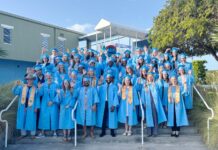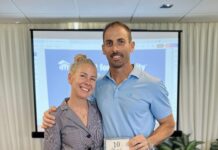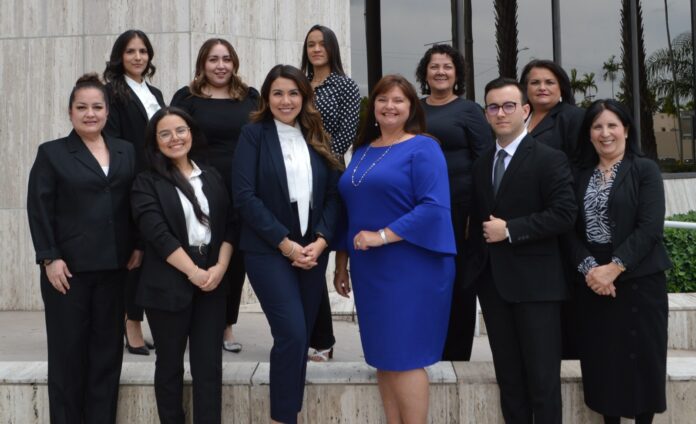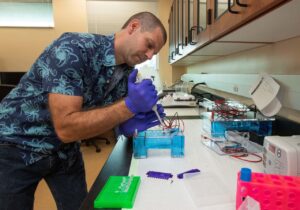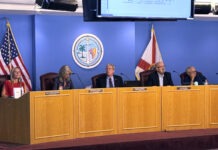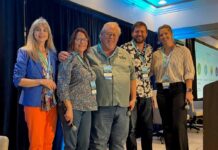Immigration law is a hot topic, and an important one that affects many locals personally. Kari Ann Fonte, board certified immigration attorney with Fonte Friz-Garcia Immigration Firm, recently opened a second office in Islamorada. She sat down with Keys Weekly to share her experience, practice and essential information for the public.
We just opened this office in June. We’ve had our office in Miami, Coral Gables, as we’ve been practicing for 28 years. But we’ve always had clients up and down the Keys, so about four years ago, my husband and I built a home down here. Since we’re spending more time in the Keys, I thought it would be nice to have a space here.
How did you get into law, and what made you choose immigration? I was in debate and loved research and making arguments. I wanted to go to law school. I studied languages in high school — Spanish, French, Russian and German. Then, when I went into law school, I took an immigration law class, and it all just came together for me. I am fluent in Spanish, and a lot of clients want to speak in their native language.
I knew I wanted to do something that helped people on a personal level. And I saw how much immigration law really affects people’s lives in such a profound way. It was a way to bring in my language skills and learn about different cultures and different walks of life — it was a great fit for me.
Immigration law has a lot of different areas. I was fortunate that right out of law school, I started with a fantastic mentor. She taught me every area as she practiced every area. That’s very rare because many people who practice immigration, for example, will only do asylum, business-related cases, or family-based cases, but I do all of it.
So, if I have someone who comes in and maybe they’re in a particular situation, I can assess all the different options that they might have. If we start down one track and something develops, good or bad, we can handle it still. We don’t have to say, “Oh, I don’t handle that type of case. Let me refer you to somebody else.” We can keep it in-house and help them through the entire process.
The most common cases are family immigration, marriage or citizenship, and removal (aka deportation). On the business side for investors — foreign talent visas can also be for pastors or music directors for churches. We also work with defense cases with a prior arrest, nothing grave, but we have to jump through hoops to keep them here. We do turn down cases if it’s fraud in the sense of the application that’s on the desk now and they are not being truthful.
We handle a lot of cases from Brazil, Columbia, Venezuela and Cuba, but also clients from all over the world, such as Thailand and Kazakhstan. We meet in person in the courtroom or sometimes on Webex.
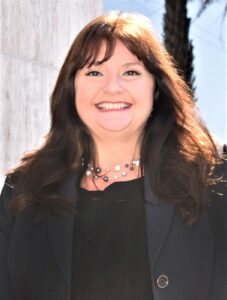
I really like the more complex matters as they’re like puzzles. I like the other cases, too, but I’ve always been a puzzle person. So, to me, finding those pieces and putting them all together is challenging. Then it’s rewarding when you get across the finish line, and you know that there are very few other lawyers who could have figured that maze out. It may be complicated because of their immigration history, or an irregularity with a prior case, or medical condition; there are all kinds of things to consider.
I also like cases based on extraordinary ability. A case for immigration where they say, “Yes, this is the kind of person we wish to give permanent residence to.” How are they going to benefit the United States?
It is highly advised if you want a green card to get a lawyer. However, it’s not required. The system is complex, so to do it on your own, you are just asking for problems. I stay up-to-date by attending and speaking at conferences. I am also a part of the American Immigration Lawyers Association, where we get daily updates and learn what it means. Having the source of information is critical.
Do you see huge swings in the law when Congress changes parties? Absolutely, in my 28 years of practice, I’ve never seen it so political as it is now. Unfortunately, immigration is being used as a hot topic or a speaking point, and it’s people’s lives. And it doesn’t matter what their political affiliation is; they’re human beings, have a family, contributing to their community, have a nice business here, and they’re employing people. It’s not what we like to think of our country being about.
There are also changes at the state level. Some state laws are already national laws, but some are causing confusion and an issue, especially in the way they are implemented and depending on the situation.
I am board-certified by the Florida Bar as an expert in immigration. You need at least five years exclusively in immigration; you have to pass an exam and have recommendations. I am sharing this because there are only 79 lawyers who are board-certified in immigration, and my partner, Alexandra Friz-Garcia, just became certified as well. She is in the Miami office.
In addition to my partner, we have a full staff, including six paralegals and law clerks who help us and provide a lot of support. They are very specialized, share the mission, are all committed and have been with me for a long time. My receptionist, Irma Mendez, actually started with my former partner before I did 31 years ago; I always joke that she’s my boss.
I also joined the Islamorada Chamber of Commerce; everyone has been welcoming and helpful.
My biggest public service announcement is don’t use someone who is not an attorney. In Latin countries, to be a notary, you have to be a lawyer. So here, often people see “notarios,” and it implies they are an attorney, but they are not. People hire them, but it makes a big mess. It is a felony to practice law without a license. We work hard to fix those cases, but sometimes it’s too late.
To connect with Fonte Friz-Garcia Immigration Firm call 305-446-1151 or www.visadoctors.com.



